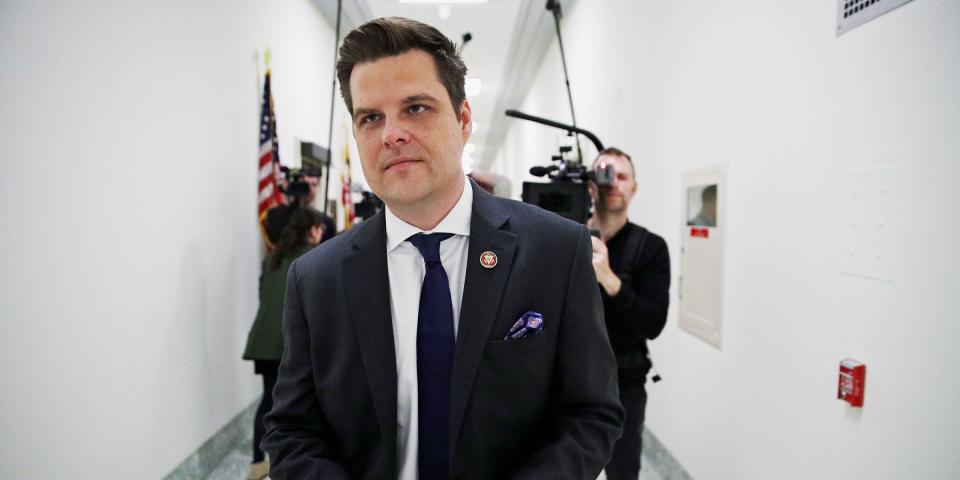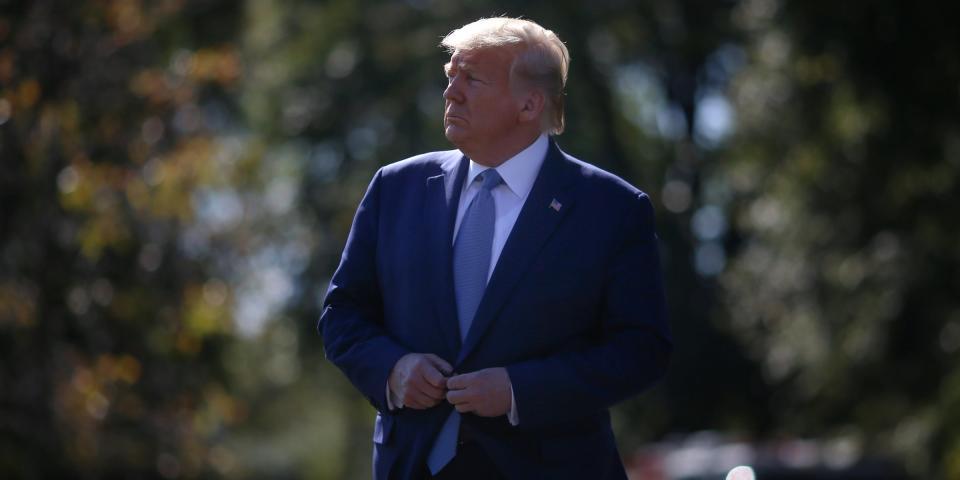Trump is getting battered on all fronts as Congress, the courts, and even his own officials eviscerate him
Associated Press
President Donald Trump is being bombarded in nearly every aspect of his personal and public life as Congress, the courts, and even at times his own administration officials, hand him defeat after defeat.
A career US diplomat gave some of the most damning testimony to Congress about Trump's policy in Ukraine, directly implicating him in dangling critical military aid to force Ukraine to cave to his personal demands.
The revelations forced Trump's congressional allies into a corner as they struggled to defend his actions and this week resorted to a failed PR stunt to change the narrative.
As far as messaging wars go, Trump also tried unsuccessfully this week to deflect blowback over his disastrous decision to pull US troops from northeast Syria, saying he showed "vision" and "courage" by doing so. But no one's buying it.
And on a personal front, the president may soon be forced to give investigators a window into his closely held tax returns.
Ukraine. Impeachment. Syria. Taxes.
President Donald Trump is being bombarded on nearly every front as Congress, the courts, and even at times his own administration officials hand him defeat after defeat that threaten his presidency.
And it doesn't look like things are letting up any time soon.
This week alone, Trump was battered with a slew of brutal developments that not only spell trouble for his remaining time in office, but also make it more difficult for even his staunchest allies to defend him.
Trump's chief Ukraine envoy unloads on him to Congress

AP Photo/J. Scott Applewhite
Perhaps the most significant revelations came from Bill Taylor, Trump's chief envoy to Ukraine who testified to lawmakers as part of Congress' impeachment inquiry on Tuesday.
A career foreign-service officer and war veteran, Taylor gave the most damning testimony to date against the president, directly implicating him in ordering the US to freeze military aid to Ukraine unless Ukrainian President Volodymyr Zelensky acceded to his demands for political investigations into his rivals.
Taylor testified that shortly after he became the US's acting ambassador to Ukraine in June he realized there were two channels through which US policy toward Ukraine was conducted: an official one, which was spearheaded by Taylor, and an unofficial one led by Trump's personal lawyer Rudy Giuliani, Energy Secretary Rick Perry, the US ambassador to the EU Gordon Sondland, and the US's special representative to Ukraine Kurt Volker, who has since resigned.
Taylor said the official channel was focused on long-standing US goals vis-à-vis Ukraine, like fending off Russian aggression and combatting widespread corruption within the country. But the unofficial channel, he said, zeroed in on one objective: getting Ukraine to help Trump's personal political motivations.
Taylor detailed how officials told him that Trump not only held up military aid to Ukraine but also refused to meet with Zelensky at the White House until the Ukrainian president publicly pledged to investigate Trump's political rivals and the FBI's investigation that found Russia intervened in the 2016 election to help Trump.
Taylor recalled a September 1 conversation with Sondland in which he said Sondland told him "everything" was dependent on Zelensky launching those investigations, including security assistance.
Sondland told Taylor that Trump wanted Zelensky "in a public box" by announcing the investigations in an interview on American television, Taylor said.
On Thursday, the Washington Post reported that shortly before that conversation between Taylor and Sondland, the US withdrew its recommendation to restore certain trade privileges to Ukraine. The report added fuel to the controversy because it was the first indication that Trump's pressure campaign against Ukraine may have extended to more than withholding military aid.
Trump allies 'pound the table' because the law and facts are against them

Alex Wong/Getty Images
The White House has tried to stem the flow of damaging revelations about how the president and his allies leveraged US policy and taxpayer dollars to force a foreign government to deliver dirt on his political rival. But their efforts have been stymied by the tide of career officials like Taylor who stepped forward to testify to lawmakers — often in defiance of the administration's orders — about what they witnessed while serving under Trump.
Trump's loyalists in Congress are working overtime to defend him, but the Republican criticisms have focused more on process than substance.
Perhaps the most illustrative example of that was when 30 House Republicans stormed a closed-door impeachment hearing in a secure congressional facility this week to protest the way Democrats are conducting the inquiry.
The lawmakers slammed their Democratic colleagues for what they said was a lack of transparency and for not allowing Republicans equal access to the documents and testimony provided so far.
But it turns out 12 Republicans who participated in the process — nearly half the group — already had permission to attend the hearing. In total, 47 Republicans have access to the information Congress has gathered so far.
The former federal prosecutor Danya Perry summed up the Republican strategy in a nutshell, telling HuffPost, "It is often said of trial lawyers that when the law is not on their side, they pound on the facts. When the facts are not on their side, they pound on the law. When neither the law nor the facts are on their side, they pound on the table. It seems there is an awful lot of table-thumping going on right now from the Trump administration and its allies."
Republicans in the Senate — the chamber responsible for holding a "trial" in the event that Trump is impeached — have been far more subdued than their colleagues in the House. Indeed, cracks are already emerging in the red wall as several GOP senators have come out in recent days to voice their concerns about Trump's actions.
Trump has so far projected confidence that he'll be let off the hook by the Republican-led Senate if he's impeached. But privately, the president's allies are working around the clock to win the "messaging war" over impeachment.
The New York Times reported on Friday that White House insiders are now planning to create a war room and add communications aides dedicated to fighting impeachment, a sign that Trump may finally be grasping the precariousness of his position.
Trump insists he showed 'vision' and 'courage' with his Syria retreat — and no one's buying it

Chip Somodevilla/Getty Images
As far as messaging wars go, Trump is also grappling with continued blowback over his disastrous decision to withdraw US troops from northeast Syria, effectively abandoning Kurdish allies in the region and leaving them open to a Turkish assault.
Trump took the White House podium this week to paint his Syria retreat as a success for the US, one day after Turkey and Russia reached an agreement that effectively solidified Moscow's dominance in the region.
Trump said on Wednesday that Turkey had told him there would be a "permanent" ceasefire in Syria but immediately followed up by saying the notion of permanence in the Middle East is "questionable."
Nonetheless, he plowed on, adding, "today's announcement validates our course of action with Turkey that only a couple of weeks ago was scorned."
"And now, people are saying, 'Wow, what a great outcome. Congratulations,'" Trump said. He didn't specify who congratulated him.
He then said his administration was lifting sanctions on Turkey that were imposed in response to its invasion of Syria.
The president also confirmed that some troops would remain in Syria to help protect oil fields, after previously saying he was bringing troops home.
Trump's policy in Syria had the rare effect of uniting Democrats and Republicans against him as they rebuked the president for abandoning the Kurds — who had roughly 11,000 ISIS fighters in their custody — and damaging US credibility for years to come. Despite that, Trump insisted this week that he showed "vision" and "courage" by pulling troops and clearing a path for Turkey to invade.
Trump's lawyers say he can't be investigated, and the courts call their bluff

Reuters
Meanwhile, on the personal front, it looks like the president may soon be forced to give investigators — and potentially the public — a window into his closely held finances.
Trump's lawyers are currently duking it out with New York state prosecutors over a subpoena for eight years of his tax returns. The subpoena is part of a criminal investigation by the Manhattan district attorney's office into whether the Trump Organization broke state laws by fabricating business records related to hush-money payments to women alleging affairs with Trump.
Trump's lawyers have put forth the bold argument that the subpoena should be nullified because, as president, Trump is immune not just from criminal prosecution, but from any investigation at all. They went as far as to say this week that local authorities couldn't investigate the president even if he shot someone in the middle of 5th Avenue, alluding to comments he made during the 2016 election.
The notion that a sitting president cannot be indicted was first mentioned in a 1973 memo from the Justice Department's Office of Legal Counsel (OLC) — the year before President Richard Nixon resigned from office.
Louis Seidman, a professor of constitutional law at Georgetown University, told Insider that there's no legal precedent backing up the OLC memo's claim. The Supreme Court also held, in Clinton v. Jones, that a president could be sued civilly while in office.
Moreover, even the OLC opinion doesn't go as far as to say a sitting president cannot be criminally investigated while in office, as Trump's lawyers have claimed in the legal fight over his tax returns.
Indeed, "even if actual indictment has to be delayed, there can be strong reasons to investigate now while the recollection of witnesses is fresh and evidence is still available," Seidman said.
Earlier this month, a federal judge also struck down Trump's argument, calling it "repugnant to the nation's governmental structure and constitutional values."
Jens David Ohlin, a vice dean at Cornell Law School who is an expert in constitutional and criminal law, told Insider that the case looked "destined" for the Supreme Court — and not because it's a close call but rather because it's the opposite.
"Chief Justice John Roberts looks for big cases around which he can build a consensus," Ohlin said. "That's exactly this case. I suspect that the vote at the Supreme Court would be 7-2, 8-1, or even 9-0 in favor of the state of New York."
NOW WATCH: How to properly fold the American flag, according to presidential candidate Rep. Seth Moulton

